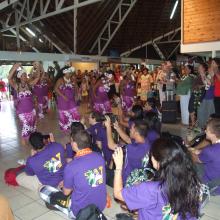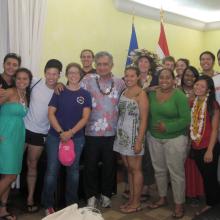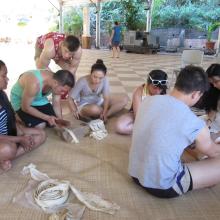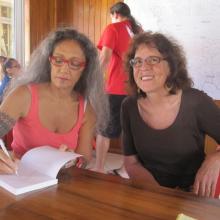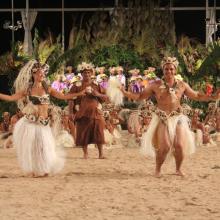When most American students think about “Tahiti,” they usually imagine a pristine setting with blue lagoons and white-sand beaches rimmed by coconut palms. Although such landscapes do exist in Tahiti, the daily reality for Tahitians is far more nuanced and complicated because Tahiti (more accurately known as French Polynesia) is still an overseas territory of France, and one of only a few colonies left in the world today. This complexity is what Professor Miriam Kahn wants students to learn about when she takes them to French Polynesia and places them in Tahitian families. Having conducted research in French Polynesia since 1993, she knows the families well and chooses those who love sharing their lives and culture with the students.
As the students on her study abroad trips learn, colonialism is profoundly complicated. Although many Tahitians support the current sovereignty movement, there are others who are deeply entrenched in the French economy and resist changing what they perceive as a comfortable situation. Students learn first hand how colonialism has woven itself into every aspect of Tahitians’ lives through such things as language, the economy, environmental policies, health care, education, religion, and tourism. They explore the history of colonialism, which included thirty years of nuclear testing by France, as well as the current anti-colonial movements as expressed in politics, literature, and the arts.
The program takes place in two locations. The first week students live together near the capital city of Pape‘ete on the main island of Tahiti, where they meet with government officials, university professors, students, and political activists. For the remaining three weeks, they live on the outer island of Huahine, where they are placed (in groups of two) with host families. While on Huahine, students also get to experience Heiva (an annual, month-long festival of dance, arts and sports that takes place in June-July).
After spending a week together on Tahiti, and right before flying to Huahine where they will go their separate ways, students usually start to worry. What will my family be like? How will I communicate with them? Will I like the food? But within hours of being welcomed at the airport by their families and by some of Huahine’s dancers, the students are happily immersed and engaged in life on Huahine. Together with their host siblings, parents, and grandparents, they work in the gardens, fish, cook, hike, dance, learn drumming, make crafts, and play sports. During the trip in 2012 almost all of the students in the group of 16 participated in Heiva, the annual dance contest, which meant that they also practiced with their dance groups every day!
Not only do the students get very attached to their host families, but the families also become attached to the students. When it’s time to leave and fly back to Seattle, it’s hard to get the students onto the plane. Indeed, in 2010, one student decided (at the airport) that he wanted to stay behind with his family. They immediately agreed and continued to take care of him on Huahine for another six weeks! As the plane’s engines start up, everyone—students and family members alike—is in tears. But the connections that are made also continue into the future. For example, this summer two of the host siblings from last summer are coming to Seattle for three weeks because they miss the UW students.
1. UW students (in purple T-shirts) being welcomed by dancers at the airport in Huahine.
2. UW students meeting with Mr. Oscar Temaru (center), president of French Polynesia.
3. UW students learning how to pound bark cloth, Tahiti.
4. Chantal Spitz (left), Tahitian author whose book the students read, and Miriam Kahn.
5. Two of the UW students (Malia Hughes and Asalemo Crawford) dancing during the Heiva festival.
